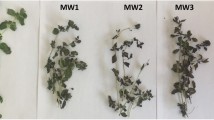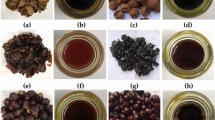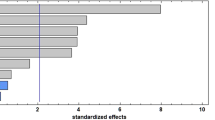Abstract
RECENT studies on fruit and vegetable processing have shown some natural constituents of the material to be very sensitive to treatments, particularly heat. In the course of dehydration experiments with roots of Brassica rutabaga, the pigmentation of the tissues has been examined in detail.
This is a preview of subscription content, access via your institution
Access options
Subscribe to this journal
Receive 51 print issues and online access
$199.00 per year
only $3.90 per issue
Buy this article
- Purchase on Springer Link
- Instant access to full article PDF
Prices may be subject to local taxes which are calculated during checkout
Similar content being viewed by others
References
Joyce, A. E. (in preparation).
Zechmeister, L., and Pinckard, J. H., J. Amer. Chem. Soc., 69, 1930 (1947).
Deuel, jun., H. J., Ganguly, B., Koe, B. K., and Zechmeister, L., Arch. Biochem. Biophys., 33, No. 1, 143 (1951).
Zechmeister, L., and Le Rosen, A. L., J. Amer. Chem. Soc., 64, 1075 (1942).
Zscheile, F. P., Harper, R. H., and Nash, H. A., Arch. Biochem., 5, 211 (1944).
Zechmeister, L., Chem. Rev., 34, 267 (1944).
Author information
Authors and Affiliations
Rights and permissions
About this article
Cite this article
JOYCE, A. Some Polyenes from Brassica rutabaga . Nature 173, 311–312 (1954). https://doi.org/10.1038/173311b0
Issue Date:
DOI: https://doi.org/10.1038/173311b0
Comments
By submitting a comment you agree to abide by our Terms and Community Guidelines. If you find something abusive or that does not comply with our terms or guidelines please flag it as inappropriate.



